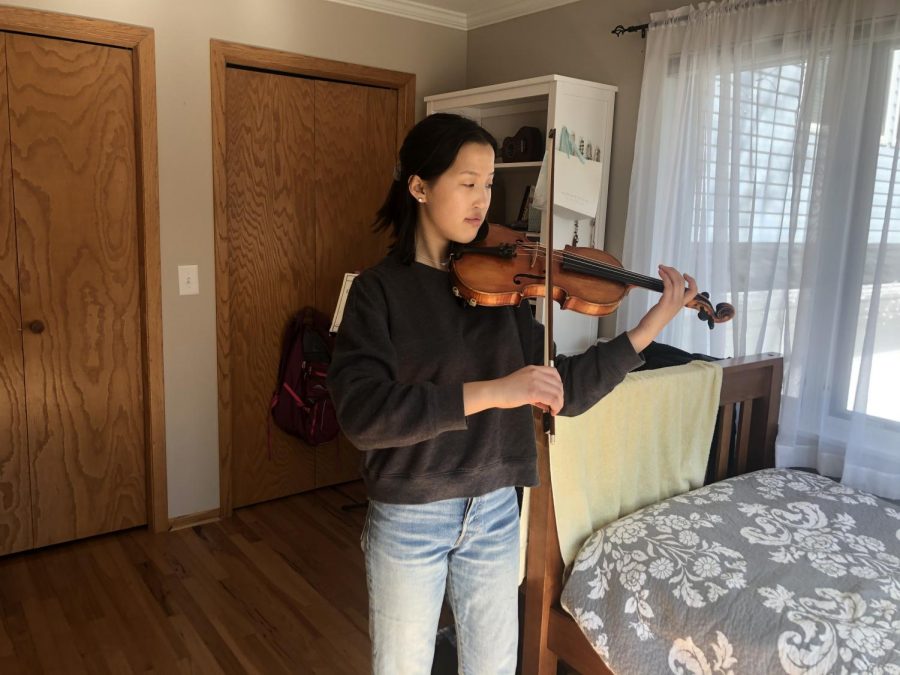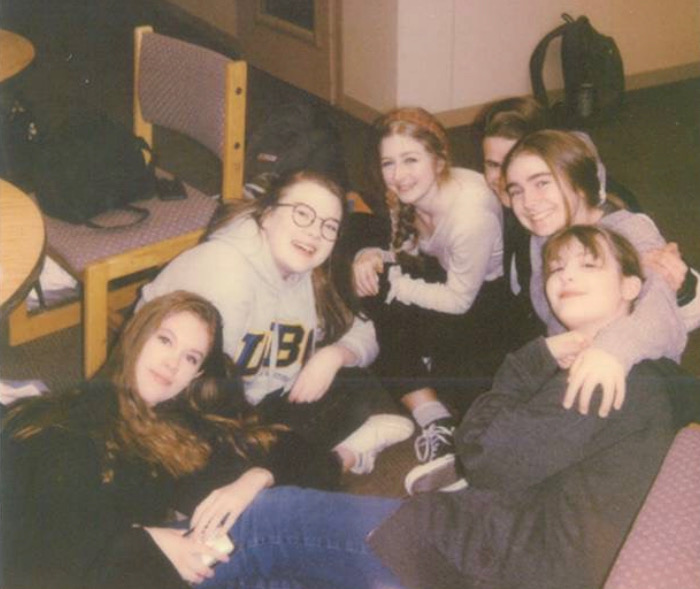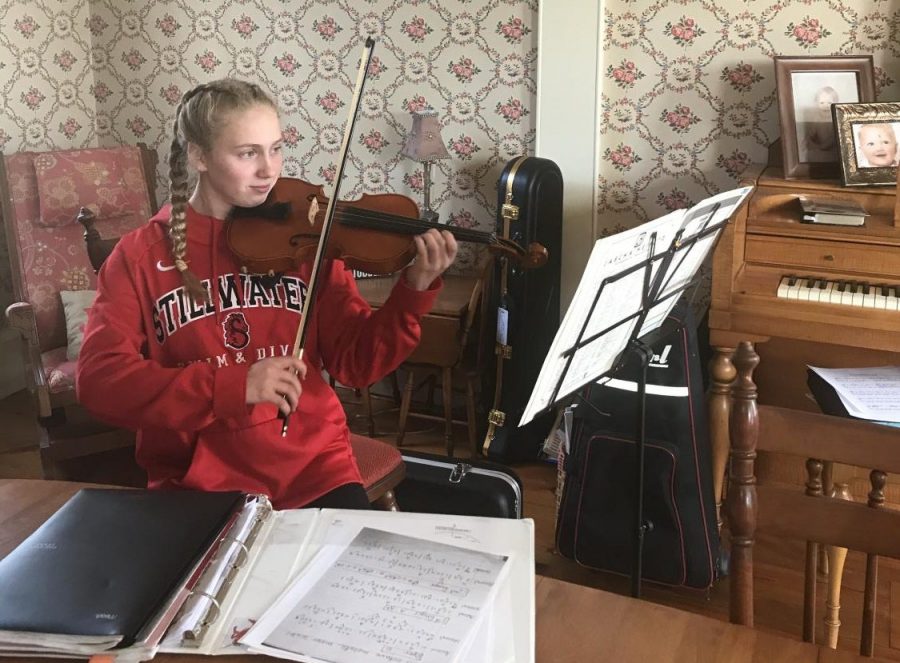Sophomore Katie Liss practices Max Bruch’s “Violin Concerto no. 1.” Concert Orchestra director, Zach Sawyer, due to distance learning constraints, will now have students input their goals for daily practice routine in a virtual practice journal.
The day the music died
March 26, 2020
Amidst a worldwide health crisis and a quarantined nation, a lot is lost to self isolation. With schools closed and distance learning in place, the arts and music departments are at a standstill. At their core, the music and theatre departments revolve around in-person learning, collaboration and events. Without this interaction, these courses and clubs can no longer thrive.
“We currently have a complete loss of the daily human connection that rehearsals allow between singers and we are losing the irreplaceable experience that a performance for an audience brings,” choir director Angela Mitchell said. “Students have worked so hard to learn notes, understand and communicate text and express it to an audience and it is quite likely that the culminating events of the year will not be able to happen.”
For the choir department, this means that all ensemble tours, like Concert Choir’s tour that was set to take place soon will be cancelled, concerts put on hold, and groups like Vagabonds no longer being able to perform on schedule. Music itself can be learned at home, but without class rehearsals there is no option for coming together to bring the music to life.
“Our rehearsals are places of full collaborative learning. Unless you are singing in a room with other people it is not choir [or band, or theater]. My students rely on each other to make music. Although each member is individually responsible for knowing their own part, the ultimate end goal is all voices working together to create art,” Mitchell explained.
The same goes for the rest of the music department’s ensembles. Zach Sawyer, director of Symphonic and Concert Orchestra, has been working diligently like many other educators to prepare for distance learning. Of course, there is no real replacement for the learning and growth that takes place in a music classroom, so instead, he has laid out a plan in which students will “practice orchestra music on their own at home, and complete a daily practice journal to keep track of what they accomplished.” Although students miss out on group performance, they can at least continue to hone their skills at home.
The orchestra was planning for a tour to Kansas City, which unfortunately will no longer take place. Students are disheartened at this loss of opportunity, and it is with heavy hearts that many have to give up their in-class community experience.
Junior Olivia Hovland plays the viola and has continued with her passion for music over quarantine for one to two hours every day. For students like Hovland, distance learning has taken away the reward for all their hard work.
“As an orchestra student, this has had a very negative impact. I was very excited for our tours and future concerts because we’ve been working really hard on our repertoire. It’s sad that we’ve worked so hard and we (most likely) will not be able to perform for our friends and family,” Hovland explained.
Band is no exception to this unfortunate series of events. Like their friends in orchestra, the band will also be missing out on their tour to Kansas City. Junior Isaac Reiner plays both the tuba and the bass trombone, and the changes to curriculum have left him absolutely devastated.
For Reiner, band is “more or less his default state of being,” and without it, he and his fellow musicians are suffering tough consequences.
“It’s killing us. It’s just impossible for us to rehearse in any meaningful way outside of school. I’m sure it hurts for the seniors especially, because they lose a concert that’s supposed to be a tribute to them, and their last band trip,” Reiner said.
However, despite all the cancellations, the trials and tribulations that distance learning will bring, the music departments continue to have hope. With different news cropping up every day in this pandemic, students and educators alike may just have the opportunity to return to normalcy in the near future. Though no one can predict what will come of this, it is their passion for music that will stand the test of this trying time.
The show must go on; how theatre addresses tragedy
Photo submitted by Elsa Persson
Musical theatre students bond during a break for their rehearsals for the “Beauty and the Beast.” The group worked hard for weeks, but due to the coronavirus pandemic, the show is now cancelled.
A great performance takes time to prepare. With daily rehearsals and a practically nonstop schedule for the last month, the theatre department was working tirelessly to put together the final show of the year, “Beauty and the Beast”. Through this process many theatre students learn that things do not always end up going to plan. Sometimes an actor forgets a line or a stage direction on shownight, things happen and the show goes on. In the case of a worldwide pandemic however, student actors are not even given the chance to improvise. With a show cancellation that no one could have expected, the department is struggling to find a solution.
“The original performance dates and process up [until the performance date] have been cancelled. It is still being determined how we will celebrate and express all the hard work the cast, crew, and pit have created so far. The best case scenario is that we get to go back into rehearsal, finish our process, and perform for large community audiences,” director Grif Sadow said.
For the many hard working young actors who spend their days after school rehearsing, the abrupt change has left many feeling aimless. An actor belongs under the warmth of a spotlight, not at home in the dark.
Junior Lillian Grimm is one of these tragedy stricken actors, who says she feels “out of place” without her daily dose of the performing arts. In her case, it is not only the loss of a show, but the loss of a loving community environment.
“Theatre is a huge part of my life. I have a very sporty family and I’ve tried just about every sport out there, but none of them clicked for me. Theatre gave me a home and another family. I love everyone in the department so much, and I cannot imagine how different my life would be without theatre. It gives me a place where I feel loved and like I belong. It gave me a reason to go to school everyday and it gave me something to smile about,” Grimm said.
Seniors in general have been heavily impacted by the pandemic, with worries for graduation and missing out on all the memories they could have made in their last months of high school. “Beauty and the Beast” was supposed to be the very last musical senior actors would perform in high school, their grand finale and the culmination of their years of progress and growth as performers.
Senior Elsa Persson is at the forefront of the theatre department’s leadership team, and has plans to continue with acting into her adulthood. This show was supposed to be her last debut in high school theatre. Instead, she has to cope with potentially never stepping foot on stage again this school year.
“Growing up in this theatre department, my senior musical was a monumental show I was looking forward to. To have it taken away by COVID-19 feels like this chapter of my life is left incomplete. It’s saddening to know that, unlike juniors and underclassmen, I won’t have a second chance to round off my time within the musical theatre part of the department,” Persson explained.
In the face of the unexpected, actors are capable of adapting to practically any situation. This collective ability to improvise and overcome is what is keeping the community strong during such an unpredictable time. Even if the show can’t go on, there are still lessons to be learned.
“I think the virus is impacting my actors on all levels – mentally, emotionally, physically. I believe the gift here though is that it is reinforcing their skill-building around adaptability, recovery, and creating from the moment. I also hope they are learning their individual power and how to stay collaborative and a team even through distance,” Sadow said.
Bridging this gap in interaction and continuing to support each other, the leadership team has been making strides to keep their actors connected through their social media. Through virtual games and activities, actors continue to express themselves, strengthen their bond and support each other through their days stuck at home. Actors continue to have faith that someday soon they may return to the stage, and even if they do not, they can only stand to grow from this experience.
“This department is very strong and is overflowing with love and talent. I have no doubt we’ll make it through this tough time and come out stronger and closer than ever before,” Grimm said.
COVID-19 closures force music auditions online
Photo submitted by Madelyn Puhrmann
Sophomore Madelyn Puhrmann practices her violin at home. Due to the COVID-19 pandemic, all musicians are forced to stay home and practice alone, making coordination between the members of the entire music group difficult.
Following the stay at home order by Governor Tim Walz, all public schools were asked to close until May 4. This caused many school-sanctioned activities to be modified or canceled, including music auditions. While the band program had largely completed auditions for the 2020-2021 school year before spring break and avoided complications related to the stay at home orders, the orchestra and choir were forced to conduct auditions online. However, evaluating musical performance over a video or audio recording is not the same as a real-life audition, which can cause complications for both the performer and the evaluator.
“The online audition seems a little less effective because the teacher cannot directly view our performance. However, we can have as many do-overs as we would like. I feel more comfortable online because I can go at my own pace, but I think that in-person auditions are better at getting me out of my comfort zone,” junior Noah Woodruff said.
For the evaluator, online auditions can hinder their ability to properly evaluate the performance. Audio quality will never be perfect, and it could make it more difficult to notice any errors in the playing. Online auditions also make it difficult to provide immediate feedback to the performer and evaluate their ability to quickly learn from their mistakes.
“Online auditions do make the process of judging auditions faster, and it is easy to go back and compare multiple recordings. However, we only see the student’s best take, and the process lacks human connection,” orchestra director Zach Sawyer said.
For the performer, it can be both a blessing and a curse to conduct auditions online. Online auditions make it very difficult for the performer to receive immediate feedback on their performance and learn ways to improve. However, being able to record multiple times until they are satisfied with their performance, as well as removing the pressure of playing for a live audience can make the stress of auditions more bearable. In addition, the requirements of auditioning could be loosened, and Woodruff stated the audition “takes a lot of the pressure off.”
“Pros of doing the audition in person would be that it is one and done. You get your audition time and you get one chance to show your skills. This is helpful because you don’t have to worry about making it perfect,” explained Puhrmann. “In the same way, this also is a con because you may have not liked the way things went and therefore wish you could’ve had a redo. With the online audition, a pro would be that you’re way less nervous because you aren’t being put on the spot. You don’t have that shaky feeling and that is helpful because it shows your skills off much more.”
At present, the only way for the music program to hold auditions is to conduct them online. While it is not the ideal situation, the music directors have worked hard to make sure the process goes as smoothly as possible. In the future, the music program may be able to use this system as a way to allow students who are unable to attend live auditions a chance to try out for a higher band.
“I would rather have an audition in person than online. However, I am more than willing to record myself and send [a video] to my teacher given the circumstances we are in,” Woodruff said.
Auditioning online is a useful tool that can be used in the future to help those who may need it, but it is not an easy process. Transitioning to an online format is difficult for students who are accustomed to live auditions, but both students and teachers handled it well and are moving towards an excellent year of music for the 2020-2021 school year.
“Overall, I feel that I was still able to evaluate students’ performance without a major change from the live auditions. However, I still prefer live auditions. I enjoy connecting with the students during the audition process,” Sawyer said.


